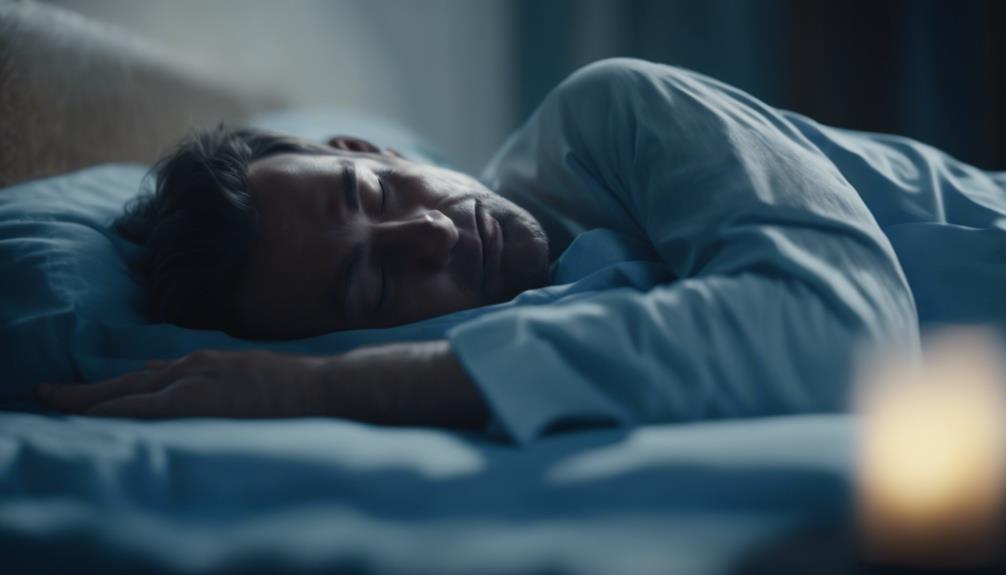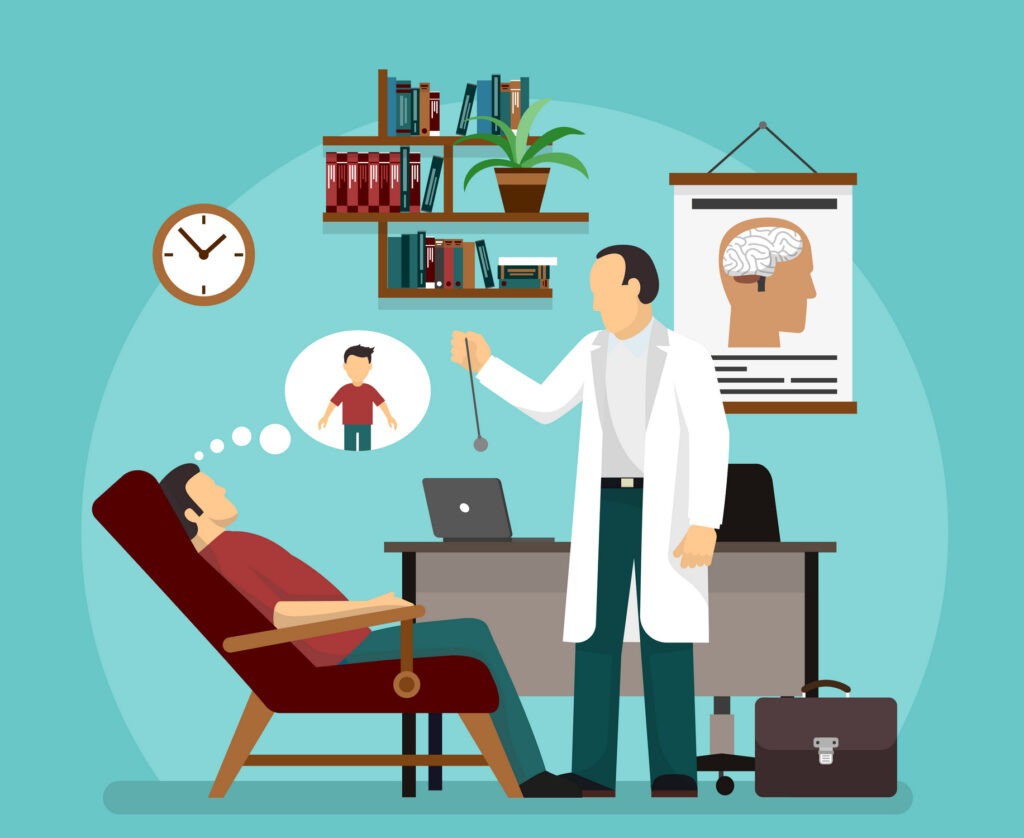
Hypnotherapy for insomnia offers an effective way to improve sleep quality by incorporating mindfulness techniques, reducing the time to fall asleep, and addressing underlying stress and anxiety. It promotes relaxation, calmness, and aids in identifying the root causes of insomnia.
Through customized treatment plans and empowerment with self-hypnosis techniques, individuals experience long-lasting results and sustainable improvements. This holistic approach targets various aspects affecting sleep patterns and equips individuals with tools to manage insomnia effectively. The benefits extend beyond just sleep, encompassing emotional well-being and personalized care.
Key Takeaways
- Improved sleep quality through mindfulness techniques and addressing psychological factors.
- Reduction in sleep latency by incorporating relaxation techniques and sleep hygiene practices.
- Alleviation of anxiety and stress with stress management techniques and holistic healing.
- Targeting underlying causes of insomnia through identifying triggers and behavioral adjustments.
- Customized treatment plans based on individual needs, medical history, and preferences.
Improved Sleep Quality
The application of hypnotherapy has shown promising results in enhancing the quality of sleep for individuals suffering from insomnia. Beyond traditional treatments like sleep hygiene and cognitive behavioral therapy (CBT), hypnotherapy offers a unique approach that incorporates mindfulness and meditation techniques. By addressing the underlying psychological factors contributing to insomnia, hypnotherapy helps individuals achieve a state of deep relaxation and mental tranquility conducive to restful sleep.
Mindfulness techniques utilized in hypnotherapy encourage individuals to focus on the present moment, letting go of worries and anxieties that often disrupt sleep. This heightened awareness cultivates a sense of calmness and control over one’s thoughts, promoting a more peaceful sleep environment.
Additionally, meditation techniques incorporated into hypnotherapy sessions help individuals quiet their minds, reduce stress levels, and improve overall sleep quality.
Reduction in Sleep Latency

Hypnotherapy has been observed to decrease the time it takes individuals to fall asleep, a phenomenon known as sleep latency reduction. This reduction in sleep latency is a pivotal aspect of improving overall sleep quality and addressing insomnia. By utilizing hypnotherapy techniques such as guided imagery, relaxation, and suggestion, individuals can experience a significant decrease in the time it takes them to shift from wakefulness to sleep.
In addition to hypnotherapy, incorporating strategies from sleep hygiene and cognitive therapy can further enhance the reduction in sleep latency.
Sleep hygiene practices focus on creating a sleep-conducive environment and bedtime routine, which can prepare the mind and body for sleep.
Cognitive therapy, on the other hand, aims to identify and challenge negative thought patterns and beliefs that may be contributing to insomnia.
Alleviation of Anxiety and Stress

Research studies have shown a significant decrease in anxiety and stress levels in individuals who have undergone hypnotherapy for insomnia. Hypnotherapy can be a valuable tool in addressing not only sleep issues but also the underlying anxiety and stress that often accompany them.
Here are some ways in which hypnotherapy helps in alleviating anxiety and stress:
- Stress Management: Hypnotherapy equips individuals with techniques to manage stress more effectively, leading to a reduction in overall stress levels.
- Emotional Well Being: By delving into the subconscious mind, hypnotherapy helps individuals process and release negative emotions, promoting a sense of emotional well-being.
- Mind-Body Connection: Hypnotherapy strengthens the connection between the mind and body, fostering a more balanced and harmonious relationship that can alleviate stress and anxiety.
- Holistic Healing: Through a comprehensive approach, hypnotherapy addresses the root causes of anxiety and stress, offering a thorough healing process that benefits the individual as a whole.
Enhanced Relaxation and Calmness

Studies have demonstrated the effectiveness of hypnotherapy in promoting enhanced relaxation and calmness in individuals struggling with insomnia. Through hypnotic techniques, hypnotherapy aims to induce a state of deep relaxation that can help alleviate stress and anxiety, common contributors to sleep disturbances. By guiding patients into a heightened state of focused attention, hypnotherapy can assist in quieting the mind and promoting mental clarity, which are essential for achieving a restful sleep.
One of the key benefits of hypnotherapy for insomnia is its ability to provide stress relief. By addressing the underlying psychological factors that may be contributing to insomnia, such as worries, fears, or intrusive thoughts, hypnotherapy helps individuals cultivate a sense of inner peace and relaxation that is conducive to falling asleep and staying asleep. This stress reduction can lead to improved sleep quality and duration, ultimately enhancing overall well-being.
Furthermore, hypnotherapy can also promote mental clarity by helping individuals declutter their minds and achieve a sense of focus and tranquility. This mental clarity not only aids in the ability to fall asleep more easily but also enhances cognitive function and emotional regulation during waking hours.
Targeting Underlying Causes of Insomnia

Addressing the root causes of insomnia involves delving into the underlying triggers that disrupt the natural sleep-wake cycle. Identifying and treating these underlying causes is essential in effectively managing insomnia.
Here are some treatment options that hypnotherapy can offer in targeting the root causes of insomnia:
- Stress Reduction: Hypnotherapy can help individuals identify sources of stress and learn relaxation techniques to manage stress levels effectively, promoting better sleep.
- Behavioral Patterns: By addressing negative behavioral patterns or habits that contribute to insomnia, hypnotherapy can help individuals adopt healthier sleep habits for improved restfulness.
- Anxiety Management: Hypnotherapy techniques can assist in reducing anxiety levels, which are often a significant contributor to insomnia, allowing for a calmer mind conducive to sleep.
- Mind-Body Connection: Hypnotherapy can help individuals explore the mind-body connection, addressing subconscious thoughts or emotions that may be impacting sleep quality, hence improving overall sleep patterns.
Non-Invasive and Drug-Free Approach

Hypnotherapy offers a non-invasive and drug-free approach to addressing insomnia by providing a natural sleep aid.
Through relaxation techniques and enhanced focus, individuals can experience improved sleep patterns without the need for medication.
This approach aims to target underlying issues contributing to insomnia, offering a holistic solution to sleep disturbances.
Natural Sleep Aid
A non-invasive and drug-free approach to improving sleep quality, hypnotherapy offers a natural sleep aid that focuses on addressing underlying psychological factors contributing to insomnia.
In addition to hypnotherapy, there are other natural methods that can help improve sleep patterns:
- Herbal Remedies: Incorporating herbal remedies such as chamomile tea or valerian root can promote relaxation and aid in falling asleep naturally.
- Bedtime Routine: Establishing a consistent bedtime routine signals to the body that it is time to wind down, making it easier to fall asleep and stay asleep throughout the night.
- Meditation Techniques: Practicing mindfulness and meditation before bed can help calm the mind and reduce stress, leading to a more restful night’s sleep.
- Sleep Hygiene: Maintaining good sleep hygiene practices such as keeping the bedroom cool and dark, limiting screen time before bed, and avoiding caffeine in the evening can contribute to better sleep quality.
These natural approaches, combined with hypnotherapy, offer a holistic solution to addressing insomnia and improving overall sleep health.
Relaxation and Focus
Enhancing relaxation and focus through non-invasive and drug-free methods is essential in promoting ideal sleep quality and addressing insomnia. Hypnotherapy offers a valuable approach to achieving this by providing stress relief and enhancing mental clarity. By inducing a state of deep relaxation, hypnotherapy helps individuals release tension and stress accumulated throughout the day, creating a conducive environment for improved sleep patterns.
Through guided imagery and suggestion, hypnotherapy can also enhance focus and mental clarity, allowing individuals to quieten intrusive thoughts that may hinder their ability to fall asleep. The relaxation techniques employed in hypnotherapy not only help in alleviating physical tension but also contribute to reducing psychological barriers to sleep, such as anxiety and racing thoughts.
Address Underlying Issues
To further address underlying issues in a non-invasive and drug-free approach, a focus on identifying and resolving root causes of insomnia becomes imperative. Hypnotherapy can explore the subconscious mind, enabling emotional healing and providing a platform for understanding the deep-seated reasons behind sleep disturbances.
Here are four key ways in which hypnotherapy can assist in addressing underlying issues:
- Subconscious Exploration: By accessing the subconscious mind, hypnotherapy can unveil hidden triggers or unresolved emotions contributing to insomnia.
- Emotional Healing: Through guided hypnosis sessions, individuals can work through past traumas or anxieties that may be disrupting their sleep patterns.
- Psychological Insight: Hypnotherapy offers insight into the psychological factors influencing sleep difficulties, allowing for a holistic approach to treatment.
- Behavior Modification: By altering thought patterns and behaviors during hypnosis, individuals can learn new coping mechanisms and habits that promote restful sleep.
Customized Treatment Plans

Tailoring treatment plans to address the unique needs and preferences of each individual is a fundamental aspect of hypnotherapy for insomnia. By offering personalized therapy, hypnotherapists can create customized treatment plans that cater specifically to the individual experiencing sleep disturbances.
This personalized approach allows for a holistic understanding of the individual’s insomnia triggers, underlying issues, and goals for treatment.
In developing customized treatment plans, hypnotherapists consider various factors such as the individual’s medical history, lifestyle, stressors, and personal preferences. By taking a holistic approach, hypnotherapy aims to not only address the symptoms of insomnia but also to uncover and tackle the root causes contributing to the sleep disorder.
Through personalized therapy, individuals can benefit from a tailored hypnotherapy experience that is designed to meet their unique needs and promote better sleep patterns.
This individualized approach enhances the effectiveness of hypnotherapy for insomnia by providing targeted interventions that resonate with the individual on a personal level.
Empowerment Through Self-Hypnosis Techniques

Self-hypnosis techniques offer individuals the means to take control of their mental state and promote relaxation.
By engaging in self-hypnosis, individuals can strengthen their inner resolve, fostering a sense of empowerment.
This practice has been shown to improve the quality of sleep, providing a natural and effective way to combat insomnia.
Self-Hypnosis for Relaxation
Utilizing techniques of self-hypnosis can enable individuals to achieve deep relaxation and enhance their overall well-being through empowered mental focus. Self-hypnosis for relaxation often involves practicing visualization techniques and mindfulness meditation to induce a state of calmness and tranquility.
Here are four key benefits of incorporating self-hypnosis for relaxation into your routine:
- Stress Reduction: By engaging in self-hypnosis for relaxation, individuals can effectively lower their stress levels, promoting a sense of inner peace and emotional balance.
- Improved Sleep Quality: Self-hypnosis techniques can help individuals achieve a state of relaxation conducive to better sleep, aiding in the management of insomnia and other sleep disorders.
- Enhanced Mental Clarity: Regular practice of self-hypnosis can sharpen mental focus, improve cognitive function, and boost overall mental clarity and acuity.
- Emotional Well-being: Self-hypnosis for relaxation can contribute to emotional well-being by reducing anxiety, enhancing mood, and fostering a sense of emotional stability and resilience.
Building Inner Strength
Exploring the realm of self-hypnosis techniques can empower individuals to strengthen their inner fortitude and resilience, fostering a mindset conducive to overcoming challenges and achieving personal development.
By delving into self-hypnosis practices, individuals can cultivate a sense of inner calm and serenity, which serves as a foundation for emotional resilience. Through techniques such as visualization, positive affirmations, and deep relaxation, individuals can tap into their subconscious mind to instill empowering beliefs and thoughts that enhance their inner strength.
Self-hypnosis offers a potent tool for individuals to develop coping strategies, manage stress, and enhance their ability to navigate life’s peaks and valleys with resilience. By regularly practicing self-hypnosis, individuals can build a reserve of inner resources that support them in times of adversity, promoting a sense of empowerment and self-confidence.
Ultimately, by honing their skills in self-hypnosis and leveraging its potential for building inner strength, individuals can cultivate a deeper connection with themselves, foster emotional resilience, and set out on a journey towards personal growth and self-improvement.
Enhancing Sleep Quality
Research studies have shown that incorporating hypnotherapy techniques into one’s bedtime routine can greatly improve sleep quality and promote better overall well-being.
When it comes to enhancing sleep quality through hypnotherapy, several key factors play an important role:
- Establishing Good Sleep Hygiene: Hypnotherapy can aid in creating a conducive sleep environment and establishing healthy bedtime routines, such as maintaining a consistent sleep schedule and limiting stimulants before bed.
- Utilizing Mind-Body Connection: Through hypnosis, individuals can tap into the mind-body connection, fostering relaxation and reducing stress levels, which are essential for quality sleep.
- Developing Relaxation Techniques: Self-hypnosis techniques can help individuals unwind, release tension, and calm the mind, promoting a state of relaxation conducive to falling asleep easily.
- Enhancing Mental Clarity: By addressing subconscious barriers to sleep and promoting positive thought patterns, hypnotherapy can enhance mental clarity and promote restful sleep.
Long-Lasting Results and Sustainable Improvements

Achieving long-term results and thorough improvements through hypnotherapy for insomnia is a key aspect that underscores its effectiveness as a treatment modality. By focusing on enduring results and employing a holistic approach, hypnotherapy addresses the root causes of insomnia, leading to not just temporary relief but lasting benefits. Unlike quick-fix solutions, hypnotherapy offers personalized care tailored to the individual’s specific needs, promoting enduring changes that persist beyond the treatment sessions.
The holistic nature of hypnotherapy allows for a detailed understanding of the factors contributing to insomnia, whether they are physical, psychological, or environmental. This integrated approach ensures that the treatment is multifaceted, targeting different aspects of the individual’s life that may be impacting their sleep patterns.
Through ongoing support and personalized strategies, hypnotherapy equips individuals with the tools to manage their insomnia effectively, fostering lasting improvements that extend well into the future.
Frequently Asked Questions About Hypnotherapy for Insomnia
Can Hypnotherapy Be Used in Combination With Other Insomnia Treatments?
When considering hypnotherapy effectiveness, it is important to explore its potential as a complementary treatment for insomnia. Combining hypnotherapy with other therapies may offer a more inclusive approach to addressing sleep issues.
Is Hypnotherapy Safe for Individuals With Psychological Disorders?
When considering hypnotherapy for individuals with psychological disorders, safety concerns must be carefully evaluated. Although hypnotherapy can offer therapeutic benefits, its appropriateness for those with psychological conditions should be evaluated by qualified professionals to guarantee safe and effective treatment.
How Many Hypnotherapy Sessions Are Typically Needed for Results?
In hypnotherapy, session frequency and treatment duration vary based on individual needs and responsiveness. Typically, clients may require weekly sessions initially, with the possibility of tapering off as progress is made, spanning several weeks to months.
Can Hypnotherapy Help With Other Sleep Disorders Besides Insomnia?
Exploring the domains of sleep disorders, hypnotherapy shows promising potential in addressing conditions like sleep apnea and narcolepsy. Research suggests tailored hypnotherapy interventions may offer benefits beyond insomnia, warranting further investigation.
Are There Any Side Effects or Risks Associated With Hypnotherapy for Insomnia?
When considering hypnotherapy for insomnia, one must weigh its effectiveness against potential risks. While generally safe, precautions should be taken for individuals with certain psychological conditions. Success rates vary, emphasizing the importance of informed decision-making.
Conclusion
To sum up, the benefits of hypnotherapy for insomnia are well-documented and supported by empirical evidence. By targeting underlying causes, reducing sleep latency, and promoting relaxation, hypnotherapy offers a non-invasive and drug-free approach to improving sleep quality.
Customized treatment plans and self-hypnosis techniques empower individuals to address their insomnia effectively. With long-lasting results and sustainable improvements, hypnotherapy proves to be a valuable tool in the management of insomnia.
Take the Next Step
Do not be afraid to reach out to me, Mark , to assist you in any issues you might have. Need a good listener or someone to confidentially talk too? . Life Coaching is 45 minute session, once a week.
Self-Hypnosis is taught in one session, individual sessions or in a group, and lasts a lifetime. Most Hypnotherapy sessions including Age regression last 2 hours and EFT Sessions are usually handled with a one hour session
To make an appointment, first listen to the Pre-talk and fill out the Complementary Healthcare Provider Disclosure. The use the Contact Form to request an appointment with, Mark, The Bohol Hypnosis Expert.
Self-help downloads are available to help you with specific problems. The self-hypnosis program to teach you how to self-hypnotize yourself is available here.






